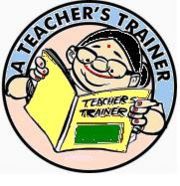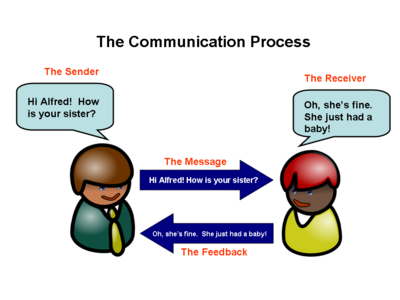COMMUNICATION SKILLS
CONTENTS
- SKILLS IN EFFECTIVE PRESENTATION
- SKILLS IN USING AUDIO-VISUAL MEDIUM
- INTERPERSONAL SKILLS OR SKILLS OF MANAGING HUMAN RELATIONSHIP
COMMUNICATION SKILLS
| After reading this material performing the activities, you will be able to:
• Understand what communication means. • Become aware of the different sub-skills of communication skill • Come to understand how these skills facilitate communications and a training situation. • Understand who to deploy communication skills to become an effective trainer. |
WHY COMMUNICATION SKILLS?
Communication skills are the basis of effective transactions in a training programme. Communication skills can be deployed while
Making presentations, both verbal and visual
Dealing with interpersonal relationships
Establishing linkages
Motivating trainees
|
For a detailed understanding of THE APPROACH TO COMMUNICATION, you may visit the following Wiki Site: [[1]]The Approach to Communication Prepare a one page summary of what you understood about the approach to communication |
LET US NOTE THIS
- Communications is the act of sharing knowledge, feelings ideas and information with others.
- Communication is usually a process of interaction. In the course of communication, the communicators influence each others ideas, attitudes, knowledge and behaviours through interaction.
- Communication can be verbal or non-verbal; face to face or at a distance in time and space. In face to face communication, gestures, body, language, tone and facial expressions affect what is being said.
- Communication is said to have taken place if what is intended is conveyed. Even while listening to the news, though it appears to be an one way communication, one can notice listeners reacting to it. Since communication takes place in a context, communication is at its best when both the parties involved understand the context.
- Communication has four dimensions
1. Physical setting (room, open place, etc
2. Social setting (relationships of the members of the group)
3. Psychological setting (formal, informal, friendly, unfriendly)
4. Point of time (morning, afternoon, time of the year, etc.)
Effective communication should take into account all these aspects.
| TYPE | EXAMPLES |
|---|---|
| One to One | Personal Talk |
| One to Many | A Lecture |
| Many to One | Students Union talks to Principal |
| Many to Many | A group discussion/a party |
In a training situation communication is usually of the type ONE to MANY
[Note: In a training programme, the method of communication need not always be face to face (lecture) on a training programme. The trainer can think of communicating to the trainees even in his/her absence, by thinking of activities of be done in the time after the sessions off sessions time could be used for
- Reinforcing what is discussed during the sessions
- Providing enrichment materials, experiences
- Setting interactive activities leading to better human relationships.
However, the off-session work should not be a repetition of the regular work. It should provide a healthy change, which in turn should lead to better participation.
| Send the Completed Activity Sheet to:
kumaraswamy64@gmail.com |
|
You can download Activity Sheet from here Activity Sheet Communication Skills }}
| Web Based Induction Programme for Elementary Teacher Educators | |
|---|---|
| For District Institutes of Education and Training (DIET), India | |
| E-Media | Getting started | Slideshow Presentations | Recording and Presenting Data | Using eMail | Finding resource on the Internet | Computers and Audio-visual resources | Creating Forms | Handling Hardware | Using Digital Projectors | Analyzing Data | Creating Educational Programs | ICT in Education |
| DIET Roles and Functions | Functions of DIETS | Competencies of DIET Functionaries | Academic Linkages | Administrative Linkages | NGO Linkages |
| Trainer Skills | Role Expectations | Communication Skills | Management Skills | Transactional Skills | Evaluation Skills |
| Action Research | General Orientation to Research | Research Studies and Its Types | Research Activities in DIETs | Action Research in Relation to Other Types of Research | The Procedure of Action Research | A Review of Efforts Done So Far | Report Writing & Documentation of Research | Appraisal of Research | Supporting Action Research at the School Level |
| Planning | Introduction |
| General Topics | Rights of the Child and RTE, 2009 | UEE and ELL | Gender Equity | Inclusive Education | Peace Education | Critical Pedagogy | Constructivism | Multi-Grade & Multi-Level Teaching | State and Central Schemes | National Policies | Right to Information, Civilian Charter | Dealing with Legal Matters | Alternative Schooling | NGO Initiatives in Education in Karnataka | Karnataka Education Act | Education for Sustainable Development |



